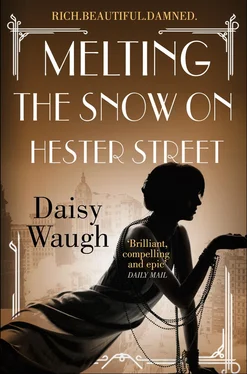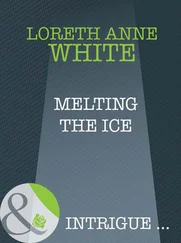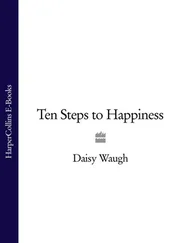Give My Regards to Broadway …, Take Me Out to the Ball Game … , Keep on the Sunny Side …
The crowd never objected. The regulars would holler for her until she came forward to stand beside him.
She didn’t do much. A song and dance. A little routine. The usual schtick . The sort of acts pretty young girls were running through in cheap bars and crowded nickelodeons all over the city. Except, when it came to it, Eleana was anything but usual. Her dark features were too large to be conventionally pretty, and there was a wildness about her, as if she were permanently searching, in hope and fear – and, above all, in vain – for an exit from whatever situation she was in. She was rough hewn, yet: still only a teenager. But she was beautiful. Matz saw it. The crowd saw it, when she sang. In years to come, the camera would see it. She was as magical as Matz up there, standing by that piano: a born performer. Her rich voice, her expressive face, her timing, her intensity, her humour, her lightness of touch – something and everything about her cast a spell. Matz told her so, endlessly. He knew she was a star, all along. He used to say so. And she must have believed it, just a little, or she wouldn’t have continued to stand up there, night after night. She wouldn’t have followed him to the ends of the earth … And she must have heard the applause, felt the warmth. She loved it back then, in the beginning. It made her feel alive.
Tonight, after she sang, they would be passing a hat for the strike fund. And when Matz stopped playing for the evening, when she’d done her song and dance, and the customers were heading home, she might pull him into the cupboard behind that beaten-up piano. Or he might pull her, probably: either way. It was where the proprietor, Mr Listig, stored any reels of film overnight. Not such a big cupboard then: no space to lie down. But big enough. At the end of the evening they always helped to put the reels away, and then – what the hell? Mr Lustig pretended not to notice. He didn’t care (so long as the reels weren’t ruined). Seventy-five cents an evening wasn’t much, after all, and Eleana didn’t even get that. She received nothing, except a wave-through at the door. A little bit of privacy at the end of the night wasn’t much, but it was a luxury not many young couples enjoyed back then, not on the Lower East Side. The use of his cupboard was a perk of the job.
She and Matz had been together for three years by then, since Eleana was fifteen. And Matz was eighteen, perhaps. Or seventeen. Nineteen … Matz always travelled light on such details. Until he met Eleana, he seemed to travel entirely alone. He came to America – he said – ten years earlier, alone with his mother, who had died since, to be reunited with his father, who never appeared at the dock to claim him. It was a daily tragedy in New York back then, when so many thousands of immigrants were pouring in every day.
And, to Matz, it was a mystery still. His father had sent the money home, enough for their passage to join him. It had taken him four years to collect enough together: four long, hungry years, saving, scrimping, living no better than a dog in the Lower East slums.
But when wife and son disembarked at last, the Statue of Liberty behind them, and a free life in the New World in front, he wasn’t at the pier to greet them, and though they waited for three days, returned every morning and every afternoon for many more, he never did come. Matz and Matz’s mother never laid eyes on him again.
So that was Matz.
He couldn’t remember his father, anyway. Couldn’t remember his home country, not really. But he remembered this and that: a grandmother, plenty of cousins, and a great crowd – the whole shtetl , his mother said, turning out to wave them off on their journey. He remembered the ship, and the long days at sea: the cramped, stale air on the lower deck, the seasickness – and the lice inspectors at Ellis Island, who had dragged him off, yanked him, screaming, from his mother’s arms. He remembered the wild, overwhelming relief when he was allowed to fall back into her arms again. He would never forget that.
And then … nothing much. The shock of the Lower East Side. The tenement flats, six storeys high, one after the other to the horizon end, blocking the sun, hiding the sky – and the teeming streets, the dirt, the smell of rotting garbage and horse manure, the roar of metal wheels on cobbled roads, the soot that rained from the elevated trains, the endless noise … And his mother finding work, and then working, and working, and never stopping … Someone used to bring vast bundles of materials to the apartment where they boarded, and then she – and the lady who took the rent, and her three daughters and an old man and someone else, and sometimes Matz, too – would sit in silence, too tired to talk, constructing silken flowers for ladies’ hats, by the hundreds, by the thousands, night after night … Someone took the bundles away when the work was completed, and brought back more bundles: a never-ending stream of bundles, squatting in the space, piled high, stealing the daylight …
What he remembers most is that airless August, when she lay dying.
They were boarding with a family on Essex Street, and the family was kind. There was tuberculosis rampant through the block that summer. With so many bodies existing so close together, when the sickness visited a building, as it did from time to time, it took with it whole families, it swept away whole floors of human life. But on this occasion, in Matz’s small apartment, only Matz’s mother fell prey – and the family they boarded with took pity. They let her stay on the only bed, they moved it to the room with the only window, and for those last few weeks, and even for a week or so afterwards, they wouldn’t take any rent from him, and they fed Matz free of charge.
After that – after that – Matz had survived. That was the main thing. He stole food from the carts on Hester Street, collected coal fallen from the back of the coal carts and sold it, or exchanged it, piece by piece. He constructed silk flowers, carried bundles, took work where he could; did whatever he had to do. And in fact he did far better than simply survive. Somehow, between the struggle to earn enough to eat, the struggle to find a place to sleep, Matz achieved what his parents had brought him to the New World to achieve: there was a charitable night school on East Broadway, founded to help little immigrant boys just like him. Without it, who knows what might have happened?
Matz learned English. He learned to read and write. Learned the piano. Discovered Karl Marx. Learned, above all, that life didn’t have to be this way; that it wasn’t this way for everyone.
When he first came to live at Eleana’s tenement flat on Allen Street – his fifth move in a year – he was a member of the Socialist Party of America, and a vocal and active member of the Garment Workers’ Union. He worked ten hours a day as a cutter at the Triangle Waist Company, already one of the largest and most productive garment factories in the city – where, because his job required skill as well as masculine brawn, he earned $12 a week; three times what the young female machinists were paid, working the same hours. He kept only what he needed to survive, and divided the rest between the Party, the Union, and the little boys on the Lower East Side who roamed the streets just as he had, whose fathers never came to meet them at the dock, whose mothers died of consumption by a small window in a filthy street, in a crowded tenement a world away from home.
That was Matz.
By comparison, Eleana had enjoyed an easy life. Who hadn’t? She was born a few crowded streets away, on Orchard Street, five years after her parents arrived off the ship. By the time she was born, her parents were fully Americanized, and took care to speak to Eleana, almost always, in English. Her sister, two years her elder, died of tuberculosis when Eleana was one. Her father, Jethro, shared a lease on a six-by-four feet pickled food store, in the hallway of a neighbouring tenement block. He died of pneumonia, aged thirty-nine, in the winter of 1905, a year or so before she and Matz met. But Eleana often remembered her father: learned, affectionate and kind, always with the smell of pickled herring hanging over him, and – like everyone she knew – always working.
Читать дальше












